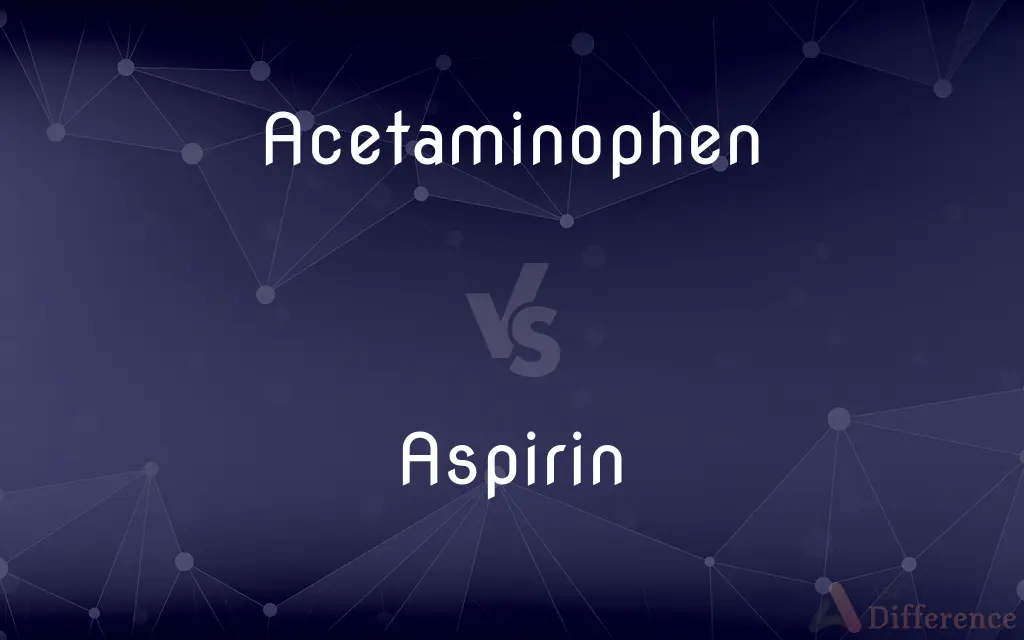Acetaminophen vs. Aspirin — What's the Difference?
By Tayyaba Rehman — Updated on September 21, 2023
Acetaminophen is a pain reliever and fever reducer, while aspirin is an anti-inflammatory drug that can also prevent blood clots. Both are over-the-counter painkillers, but they have different uses and side effects.

Difference Between Acetaminophen and Aspirin
Table of Contents
ADVERTISEMENT
Key Differences
Acetaminophen and aspirin are both common over-the-counter medications, but they serve different primary functions. Acetaminophen, often recognized by its brand name Tylenol, is primarily used to alleviate pain and reduce fever. It operates in the central nervous system to dull pain perceptions and reduce fever, but it doesn't have any significant anti-inflammatory properties.
Aspirin, on the other hand, not only provides pain relief but also has anti-inflammatory properties. This makes it useful for conditions like arthritis. Additionally, aspirin has an anticoagulant effect, which means it can prevent blood clots. Many people take a low dose of aspirin daily as a preventive measure against heart attacks and strokes, under the guidance of a doctor.
Another significant distinction is related to side effects. Overuse or prolonged consumption of acetaminophen can lead to liver damage or failure. It's crucial for users to be aware of the total acetaminophen intake, as it's found in many combination drugs. Aspirin, meanwhile, can lead to stomach ulcers or bleeding due to its anti-coagulant properties.
Furthermore, while both drugs can be taken for headaches or minor pains, aspirin is often recommended for inflammatory conditions or cardiovascular prevention. Acetaminophen is more advised for those who can't tolerate aspirin or are at risk of bleeding complications. It's always important to consult with a healthcare provider before starting any medication regimen.
Comparison Chart
Primary Use
Pain reliever and fever reducer
Pain reliever, anti-inflammatory, anticoagulant
ADVERTISEMENT
Anti-inflammatory
No
Yes
Common Side Effects
Liver damage with overuse
Stomach bleeding, ulcers
Anticoagulant Property
No
Yes
Typical Dosage Form
Tablet, liquid, gel
Tablet, chewable, enteric-coated
Compare with Definitions
Acetaminophen
An analgesic drug used to relieve pain and reduce fever.
She took acetaminophen to soothe her headache.
Aspirin
A medication that can prevent blood clotting.
Doctors often recommend a daily dose of aspirin for certain heart conditions.
Acetaminophen
A common ingredient in many combination medications.
Many cold remedies contain acetaminophen for fever reduction.
Aspirin
A common remedy for headaches, pain, and fever.
Aspirin provided quick relief for her persistent migraine.
Acetaminophen
A non-prescription medication that lacks anti-inflammatory properties.
For inflammation, acetaminophen may not be as effective as other drugs.
Aspirin
A salicylate drug with analgesic, anti-inflammatory, and antipyretic properties.
He took aspirin for his joint pain and inflammation.
Acetaminophen
An over-the-counter drug potentially harmful to the liver in large doses.
Chronic intake of high doses of acetaminophen can be toxic to the liver.
Aspirin
An over-the-counter drug that can cause stomach bleeding if overused.
Extended use of aspirin requires monitoring for gastrointestinal side effects.
Acetaminophen
A central nervous system drug that acts to diminish the perception of pain.
After her surgery, acetaminophen helped manage her discomfort.
Aspirin
A drug beneficial for cardiovascular health when taken in low doses.
After consulting her doctor, she began a regimen of low-dose aspirin for heart health.
Acetaminophen
A crystalline compound, C8H9NO2, used in medicine to relieve pain and reduce fever. Also called paracetamol.
Aspirin
Aspirin, also known as acetylsalicylic acid (ASA), is a medication used to reduce pain, fever, or inflammation. Specific inflammatory conditions which aspirin is used to treat include Kawasaki disease, pericarditis, and rheumatic fever.Aspirin given shortly after a heart attack decreases the risk of death.
Acetaminophen
(North America) A white crystalline compound used in medicine as an anodyne to relieve pain and reduce fever.
Aspirin
A white, crystalline compound, C9H8O4, derived from salicylic acid and commonly used in tablet form to relieve pain and reduce fever and inflammation. It is also used as an antiplatelet agent. Also called acetylsalicylic acid.
Acetaminophen
A white crystalline compound (HO.C6H4.NH.CO.CH3) used as an analgesic and also as an antipyretic. It has molecular weight 151.16. It is the active ingredient in the commercial analgesics Tylenol and Datril.
Aspirin
A tablet of aspirin.
Acetaminophen
An analgesic for mild pain; also used as an antipyretic; (Datril and Tylenol and Panadol and Phenaphen and Tempra and Anacin III are trademarks of brands of acetaminophen tablets)
Aspirin
An analgesic drug, acetylsalicylic acid
Aspirin
(countable) a tablet containing this substance
Aspirin
A white crystalline compound, acetyl salicylic acid (CH3.CO.O.C6H4.CO.OH) widely used as a drug for relief of pain and alleviation of fever. It has analgesic, antipyretic, and antiinflammatory properties, and is one of a class of agents called non-steroidal antiinflammatory drugs (NSAIDs). The name was originally a trade name, but has become the preferred name for the substance. It is actually a prodrug, liberating salicylic acid, the ultimate pharmacologically active agent, in the intestines. It is more effective when taken orally than is salicylic acid, because it dissolves more readily.
Aspirin
The acetylated derivative of salicylic acid; used as an analgesic anti-inflammatory drug (trade names Bayer and Empirin) usually taken in tablet form; used as an antipyretic; slows clotting of the blood by poisoning platelets
Common Curiosities
Can aspirin prevent heart attacks?
Yes, low-dose aspirin can reduce the risk of heart attacks for certain individuals, but always consult a doctor before starting.
Why is aspirin sometimes referred to as a "blood thinner"?
Aspirin has anticoagulant properties, which means it can prevent blood clots, leading to its "blood-thinning" descriptor.
Is acetaminophen the same as Tylenol?
Yes, Tylenol is a brand name for acetaminophen.
Can I take both acetaminophen and aspirin together?
While it's possible, it's crucial to consult with a healthcare provider to avoid potential interactions or overdosing.
Is it safe to take acetaminophen daily?
Acetaminophen can be taken daily, but it's important not to exceed recommended doses and be aware of other medications that might contain it.
Share Your Discovery

Previous Comparison
Stubby vs. Stubbie
Next Comparison
Molality vs. OsmolalityAuthor Spotlight
Written by
Tayyaba RehmanTayyaba Rehman is a distinguished writer, currently serving as a primary contributor to askdifference.com. As a researcher in semantics and etymology, Tayyaba's passion for the complexity of languages and their distinctions has found a perfect home on the platform. Tayyaba delves into the intricacies of language, distinguishing between commonly confused words and phrases, thereby providing clarity for readers worldwide.














































